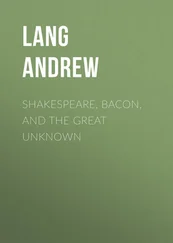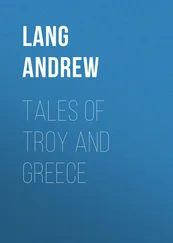Andrew Lang - Cock Lane and Common-Sense
Здесь есть возможность читать онлайн «Andrew Lang - Cock Lane and Common-Sense» — ознакомительный отрывок электронной книги совершенно бесплатно, а после прочтения отрывка купить полную версию. В некоторых случаях можно слушать аудио, скачать через торрент в формате fb2 и присутствует краткое содержание. Жанр: foreign_antique, foreign_prose, на английском языке. Описание произведения, (предисловие) а так же отзывы посетителей доступны на портале библиотеки ЛибКат.
- Название:Cock Lane and Common-Sense
- Автор:
- Жанр:
- Год:неизвестен
- ISBN:нет данных
- Рейтинг книги:4 / 5. Голосов: 1
-
Избранное:Добавить в избранное
- Отзывы:
-
Ваша оценка:
- 80
- 1
- 2
- 3
- 4
- 5
Cock Lane and Common-Sense: краткое содержание, описание и аннотация
Предлагаем к чтению аннотацию, описание, краткое содержание или предисловие (зависит от того, что написал сам автор книги «Cock Lane and Common-Sense»). Если вы не нашли необходимую информацию о книге — напишите в комментариях, мы постараемся отыскать её.
Cock Lane and Common-Sense — читать онлайн ознакомительный отрывок
Ниже представлен текст книги, разбитый по страницам. Система сохранения места последней прочитанной страницы, позволяет с удобством читать онлайн бесплатно книгу «Cock Lane and Common-Sense», без необходимости каждый раз заново искать на чём Вы остановились. Поставьте закладку, и сможете в любой момент перейти на страницу, на которой закончили чтение.
Интервал:
Закладка:
In early middle age, about 1874, Mr. Moses began to read such books as Dale Owen’s, and to sit ‘attentive of his trembling’ table, by way of experiment. He soon found that tables bounded in his presence, untouched. Then he developed into a regular ‘medium’. Inanimate objects came to him through stone walls. Scent of all sorts, and, as in the case of St. Joseph of Cupertino, of an unknown sort, was scattered on people in his company. He floated in the air. He wrote ‘automatically’. Knocks resounded in his neighbourhood, in the open air. ‘Lights’ of all varieties hovered in his vicinity. He spoke ‘automatically,’ being the mouth-piece of a ‘spirit,’ and very dull were the spirit’s sermons. After a struggle he believed in ‘spirits,’ who twanged musical notes out in his presence. He became editor of a journal named Light ; he joined the Psychical Society, but left it when the society pushed materialism so far as to demonstrate that certain professional mediums were convicted swindlers.
The evidence for his marvels is the testimony of a family, perfectly respectable, named Speer, and of a few other witnesses whom nobody can suspect of conscious inaccuracy. There remain, as documents, his books, his MS. notes, and other corroborative notes kept by his friend Dr. Speer, a sceptic, and other observers.
It is admitted that Mr. Moses was not a cautious logician, his inferences are problematic, his generalisations hasty. As to the facts, it is equally difficult to believe in them, and to believe that Mr. Moses was a conscious impostor, and his friends easy dupes. He cannot have been an impostor unconsciously in a hypnotic state, in a ‘trance,’ because his effects could not have been improvised. If they were done by jugglery, they required elaborate preparations of all sorts, which must have been made in full ordinary consciousness. If we fall back on collective hallucination, then that hallucination is something of world-wide diffusion, ancient and continuous, for the effects are those attributed by Iamblichus to his mystics, by the Church to her saints, by witnesses to the ‘possessed,’ by savages to medicine-men, and by Mr. Crookes and Lord Crawford to D. D. Home. Of course we may be told that all lookers-on, from Eskimo to Neoplatonists and men of science, know what to expect, and are hallucinated by their own expectant attention. But, when they expect nothing, and are disappointed by having to witness prodigies, the same old prodigies, what is the explanation?
The following tabular statement, altered from that given by Mr. Myers in his publication of Mr. Moses and Dr. Speer’s MS. notes, will show the historical identity of the phenomena. Mr. Moses was the agent in all; those exhibited by other ancient and modern agents are marked with a cross.
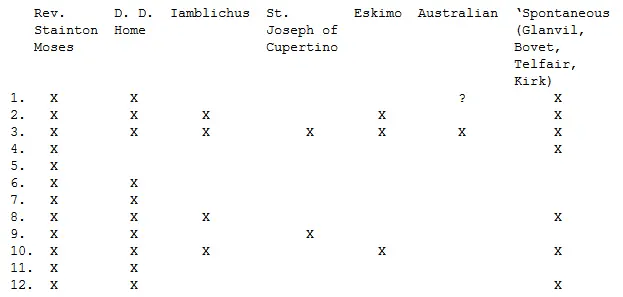
1. ‘Intelligent Raps.’
2. ‘Movement of objects untouched.’
3. ‘Levitation’ (floating in air of seer).
4. Disappearance and Reappearance of objects. The ‘object’ being the medium in some cases.
5. Passage of Matter through Matter.
6. Direct writing. That is, not by any detected human agency.
7. Sounds made on instruments supernormally.
8. Direct sounds. That is, by no detected human agency.
9. Scents.
10. Lights.
11. Objects ‘materialised.’
12. Hands materialised, touched or seen.
There are here twelve miracles! Home and Iamblichus add to Mr. Moses’s répertoire the alteration of the medium’s height or bulk. This feat still leaves Mr. Moses ‘one up,’ as regards Home, in whose presence objects did not disappear, nor did they pass through stone walls. The questions are, to account for the continuity of collective hallucinations, if we accept that hypothesis, and to explain the procedure of Mr. Moses, if he were an impostor. He did not exhibit before more than seven or eight private friends, and he gained neither money nor dazzling social success by his performances.
This page in the chapter of ‘demoniac affections’ is thus still in the state of ébauche . Mr. Moses believed his experiences to be ‘demoniac affections,’ in the Neoplatonic sense. Could his phenomena have been investigated by the Archbishop of Canterbury, Dr. Parker, Messrs. Maskelyne and Cook, and Professor Huxley, the public mind might have arrived at some conclusion on the subject. But Mr. Moses’s chief spirit, known in society as ‘Imperator,’ declined to let strangers look on. He testified his indignation in a manner so bruyant , he so banged on tables, that Mr. Moses and his friends thought it wiser to avoid an altercation.
This exclusiveness of ‘Imperator’ certainly donne furieusement à penser . If spirits are spirits they may just as well take it for understood that performances ‘done in a corner’ are of no scientific value. But we are still at a loss for a ‘round’ and satisfactory hypothesis which will colligate all the alleged facts, and explain their historical continuity. We merely state that continuity as a historical fact. Marvels of savages, Neoplatonists, saints of Church or Covenant, ‘spontaneous’ phenomena, Mediumistic phenomena, all hang together in some ways. Of this the Church has her own explanation.
COMPARATIVE PSYCHICAL RESEARCH
A Party at Ragley Castle. The Miraculous Conformist. The Restoration and Scepticism. Experimental Proof of Spiritual Existence. Glanvill. Boyle. More. The Gentleman’s Butler . ‘ Levitation .’ Witchcraft. Movements of Objects. The Drummer of Tedworth. Haunted Houses. Rerrick. Glenluce. Ghosts. ‘Spectral Evidence.’ Continuity and Uniformity of Stories. St. Joseph of Cupertino, his Flights. Modern Instances. Theory of Induced Hallucination. Ibn Batuta. Animated Furniture. From China to Peru. Rapping Spirit at Lyons. The Imposture at Orleans. The Stockwell Mystery. The Demon of Spraiton. Modern Instances. The Wesleys. Theory of Imposture. Conclusion.
In the month of February, 1665, there was assembled at Ragley Castle as curious a party as ever met in an English country-house. The hostess was the Lady Conway, a woman of remarkable talent and character, but wholly devoted to mystical speculations. In the end, unrestrained by the arguments of her clerical allies, she joined the Society of Friends, by the world called Quakers. Lady Conway at the time when her guests gathered at Ragley, as through all her later life, was suffering from violent chronic headache. The party at Ragley was invited to meet her latest medical attendant, an unlicensed practitioner, Mr. Valentine Greatrakes, or Greatorex; his name is spelled in a variety of ways. Mr. Greatrakes was called ‘The Irish Stroker’ and ‘The Miraculous Conformist’ by his admirers, for, while it was admitted that Dissenters might frequently possess, or might claim, powers of miracle, the gift, or the pretension, was rare among members of the Established Church. The person of Mr. Greatrakes, if we may believe Dr. Henry Stubbe, physician at Stratford-on-Avon, diffused a pleasing fragrance as of violets. Lord Herbert of Cherbury, it will be remembered, tells the same story about himself in his memoirs. Mr. Greatrakes ‘is a man of graceful personage and presence, and if my phantasy betrayed not my judgement,’ says Dr. Stubbe, ‘I observed in his eyes and meene a vivacitie and spritelinesse that is nothing common’.
Конец ознакомительного фрагмента.
Текст предоставлен ООО «ЛитРес».
Прочитайте эту книгу целиком, купив полную легальную версию на ЛитРес.
Читать дальшеИнтервал:
Закладка:
Похожие книги на «Cock Lane and Common-Sense»
Представляем Вашему вниманию похожие книги на «Cock Lane and Common-Sense» списком для выбора. Мы отобрали схожую по названию и смыслу литературу в надежде предоставить читателям больше вариантов отыскать новые, интересные, ещё непрочитанные произведения.
Обсуждение, отзывы о книге «Cock Lane and Common-Sense» и просто собственные мнения читателей. Оставьте ваши комментарии, напишите, что Вы думаете о произведении, его смысле или главных героях. Укажите что конкретно понравилось, а что нет, и почему Вы так считаете.
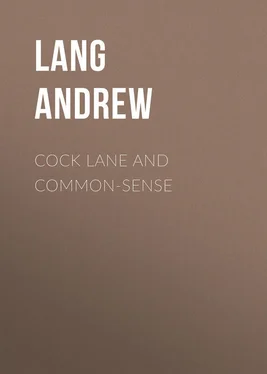

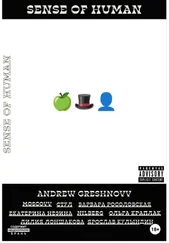
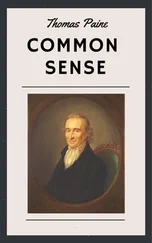



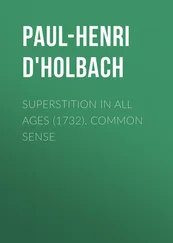
![Andrew Lang - XXXII Ballades in Blue China [1885]](/books/745214/andrew-lang-xxxii-ballades-in-blue-china-1885-thumb.webp)
